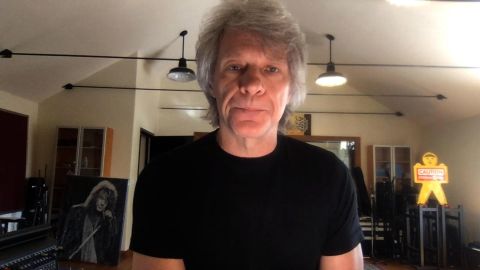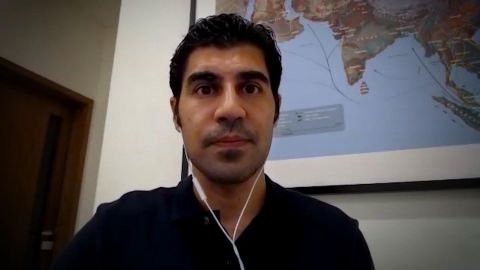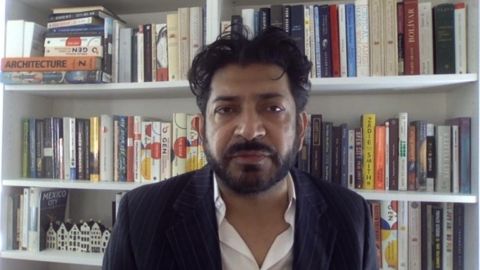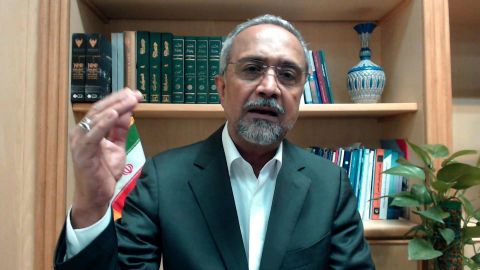Read Transcript EXPAND
CHRISTIANE AMANPOUR: Parag Khanna is the bestselling author of “The Future is Asian.” And he’s been studying the spread across the continent. He talks to our Hari Sreenivasan from his home in Singapore about the lessons the United States can learn from China and whether this pandemic will have a lasting impact on the global world order.
(BEGIN VIDEO TAPE)
HARI SREENIVASAN: Parag, what’s interesting is, is that we have been focused on China, but there have been very different outcomes from different Asian countries over the past couple of months.
PARAG KHANNA, AUTHOR, “THE FUTURE IS ASIAN”: It is a great place to start the question. And let’s just step back for a second and remind ourselves that, for the last 10, 15 years, whenever people say Asia, they think China, as if the region is one large authoritarian bloc. And it’s not. And the countries that have managed the crisis, the pandemic, most successfully have been Asia’s democracies. I’m excluding, of course, India, the largest democracy in the world and certainly that of Asia, because we don’t really know about the spread of the virus there, though they have at least managed to impose some kind of a lockdown. But let’s look at the gold standard democracies of Asia, which are, indeed, Japan, Taiwan, South Korea. They have worked very hard to manage the crisis. They have brought down their numbers. They are democratic, liberal, open, transparent societies. The difference has been that they have very strong state capacity. The leaders enjoy public trust. They came to very, you know, scientifically thought-through decisions, and they were able to convince the public to comply. And it has a lot to do, obviously, with the fact that they experienced the SARS epidemic about 18 years ago. But, still, clearly, there is not necessarily a tension between successfully galvanizing, motivating, organizing society and being a democracy. And I think that if we can take away one lesson from how Asia, in particular these countries managed it, it is that.
SREENIVASAN: So, how is life in Singapore right now? I know that it’s not normal, per se, but considering your proximity and travel to and from China, everybody in Singapore pretty much has to fly out of that country if you want to leave to go anywhere, it’s remarkable how low the number of incidents and the number of deaths are there.
KHANNA: We are on, you know, something of a lockdown, if you will. Schools are going to be closed. But, again, it’s a country that has, you know, fiber ubiquitous in every home. So, you know, kids will learn from school. You know, there is outdoor life, right? There is a lot of green space. You know, people can go to public parks and that kind of thing. Again, they have imposed social distancing very well. They have this cool app called TraceTogether. Quite frankly, this is an interesting topic of discussion. If they had made it mandatory for everyone to download this app, then it could be that they would have traced even more cases than they have. But it’s been voluntary. I actually think they should shift to a mandatory requirement that people use this app. But, that said, life is quite normal. There have been four deaths in the country, which is, you know, very low, but tragic. It’s mostly been elderly people with preexisting conditions. But they are — again, the communications, the messaging is so rock-solid. It’s very transparent. They ground it in the science and in where things are going right now. And, therefore, it’s very credible.
SREENIVASAN: Describe how the app works and what level of information the government has. Are there any privacy concerns here?
KHANNA: Right. The TraceTogether app is quite well-constructed to address privacy concerns, because, technically, the government has zero information. When you download the app, the app is on and it simply collects Bluetooth signals around who you have been near, but it’s always on your phone, and it never leaves your phone. And you could delete it or switch off the app at any time. If and when your phone number pops up on someone else’s records who has been infected and the government’s tracing team has access that person, I think you would probably agree that it’s fair when you’re — if you’re infected and you’re proven to have the virus, that you would voluntarily say, hey, here, take – – look at my phone and see if I have infected anyone else. That’s not exactly unfair. Then only would they trace those signals or would access those signals and correlate it to, again, this anonymous I.D. number that’s created by your mobile number. And then you can be contacted by the government, again, more or less anonymously, saying, hey, we just want you to know that there is a patient, you were near him or her six, seven, eight, nine, 10 days ago. We’d recommend that you exercise caution. But the government does not have your data. And there is a very ironclad sort of promise that, as soon as this period is over, you can — you will get a message from the government saying, please delete this app. Please make sure that your data can in no way be compromised. This virus is over. Delete the app.
SREENIVASAN: When we go forward a little bit, what do you think the significant changes are going to be? Because one of the things that this started to point out was our global interdependence, that our labor is not necessarily where our consumption is happening. And that’s going to cause problems when something like this goes down.
KHANNA: Well, the consequences are going to be manifold. And economics is one of them. Reforms and more public investment, obviously, in health care systems is another one. I am forecasting that migration will be a significant one. And in our — you — you can definitely appreciate. This we are at a truly unique moment in history, where we are — there is a simultaneous global lockdown, if you will, this sort of voluntary and involuntary reset of global demographics. There is zero net migration happening on the planet Earth right now. So imagine a hypothetical moment six months or one year from now where the world is declared virus-free. That’s obviously not the way it’s going to play out, but just imagine. We are going to witness a real-time experiment with people voting — where people will vote with their feet. And those who have lived through and in — been in a red zone and no longer have faith in that city, state, province, or country’s capacity to protect them are going to be looking for other places to go, if the other country is willing to take them. So we’re going to see shift of populations, population transfer. We will see countries that have labor shortages welcoming people. Now, that’s obviously paradoxical, because we’re going to have very high unemployment. But, as we know, migration is not a function necessarily of simply a country having low unemployment and therefore needing people. It’s about skills. And, right now, Hari, as I’m sure you have reported, U.S. embassies around the world are saying, if you have a medical degree, if you are a doctor, if you are a nurse, please come quickly to the nearest U.S. Embassy. We’re going to give you a visa and bring you to America. But we have record unemployment, right? So it’s not about — it’s about skills mismatches. And we already have enormous skills mismatches in the world. And we’re going to continue to have them once this stops. So we’re going to witness this real new experiment in the next phase of human migration.
SREENIVASAN: How much of that migration also, do you think, is going to be motivated in part by, say, white-collar workers around the world who figured out that I can do this job from home, maybe I shouldn’t be paying the rent that I’m paying in the city that I’m living in?
KHANNA: When you factor in the technological change and perhaps the comfort level that companies will have in terms of remote working or even wanting to encourage remote working because it may be cheaper than renting commercial real estate, which is expensive, so not only will it potentially be encouraged by some companies, but the mobile talent who always wanted to telecommute more is now going to be able to say, I told you so, and let me keep on doing this. And maybe I won’t have to do it from 10 miles or 15 miles from the office in an expensive city. But I think I’m going to go to Idaho or Wyoming or Bali or something like that. And I think we will see that, because the reason I know we will see it, Hari, is because that is exactly what has been happening. And now those people actually have a stronger hand in terms of their negotiations with their employers.
SREENIVASAN: Does this change sort of global order of things? I mean, does it accelerate the end of U.S. dominance?
KHANNA: From the point of view of analyzing American foreign policy and America’s image in the world, we wouldn’t isolate it to just this event, though a lot of people will elevate this moment as a turning point. But let’s remember that we have almost, 20 years ago, the response to the 9/11 terrorist attacks, failed wars in Iraq and Afghanistan, the delegitimation of the American capitalist model because of the financial crisis, you know, the partisanship and polarization that surrounded the 2016 election of Trump, and so forth. So, when you think about the image of America in the world and the perspectives about American leadership, it’s been a fairly checkered story for a couple of decades now. But let’s just talk about policies. When you think about Asians, again, the leaders across Asia have been fairly blunt with American officials when they come through the region, which is that they’re disappointed at the commitment to the alliance system. The demonstration or provision of shared resources and collective security has been wobbly. The Trump administration has made these very, you know, sort of strong and almost out-of-the-blue demands for burden-sharing financially in the alliance that these countries can’t necessarily afford. Then there’s the trade issue and so forth. So I think that this — it’s not about a change in leadership, simply because we’re more heading towards a leaderless world than a world where China replaces America. So I think it’s a tricky question and a shifting target. We should not be looking, though, for two things. We should not be looking for China to become number one, because we’re not moving into a world that wants there to be a number one. And we’re certainly not, at the same time, going to have a world where America magically rebounds and becomes number one again, A, because that’s not in our material capability to do so right now. It’s certainly not even a bipartisan desire that exists in America. And let’s remember the rest of the world has also moved on. It doesn’t want to follow anyone. Every country wants to be the pilot of its own plane and be in the driver’s seat.
SREENIVASAN: The interdependence that the United States has for China, the president has said, we’re too dependent on China. Does the U.S. have the resources necessary to bring all of these goods and services that we import from China back in-house to be less dependent?
KHANNA: Absolutely, it does. And this is one of the critical things why I don’t want to write off or write down the U.S., even in a time like this, because if you — geopolitics is not about the flavor-of-the-month issue or how well or how badly you performed in one war or in response to one crisis. It’s something much more sort of structural, fundamental. And if you think about the United States in particular, or North America in general, you have got 450 or 500 million people, so a very strong demographic base. You have all the natural resources you could ever want, right? You have got all the food, all the fuel, all the timber, everything, right, the bounty of nature that North America possesses. You have a very strong labor force. You have all of the financial capital, wealth, all of the technology and innovation and the industrial capabilities. Globalization and outsourcing and financial capitalism have been choices that American industry and American leaders and American companies have made. They aren’t necessary. So, America can near-shore on the back of having very cheap energy, having labor automation, having an abundant labor force. Everything from toys to semiconductors to medical devices can most definitely be made in the United States. It’s hardly out of the realm of possibility. It’s comical to think that there’s anything in the world, quite frankly, that can’t be made in the United States. There have been episodes like the rare earth mineral export ban, when China, 10 years ago, started to say, wait a minute, we have got this. Very deep in the earth’s crust, we have these access to these rare earth minerals. And those components are necessary for mobile phones and other kinds of devices, and we’re going to block the export of those things to Japan and other countries. And then the United States said, wait a minute ,we’re buying them from you out of convenience. We have lots of rare earths too, and so does Mongolia, and so does Canada. And so that action that China took actually just reminded everyone of why they shouldn’t depend on China.
SREENIVASAN: Does it change China’s dependence on the United States?
KHANNA: Well, China is actually much less dependent on the United States than people think. For China, its dependence on America is measured in very, very different optional kinds of materialistic kind of ways. So, for example, starting after 2015, when the U.S. Congress had ended the ban on exporting hydrocarbons, right, once the shale oil revolution really kicked in, America had — became one of the world’s largest oil and gas producers. So China actually became one of the largest consumers of American oil and gas by 2016-2017. Then came to trade war, and then China halted the imports of American oil and gas. China also buys lots of industrial goods and technologies from the U.S. But it has been trying at a breakneck pace to practice what I call permanent substitution, right? How do you — how can you make inside China everything that you depend on others for, particularly if it’s a sensitive technological area, where you’re worried that the Trump administration or any U.S. government will simply impose export controls on it? And that’s obviously what’s happened in a number of critical areas. So, now Huawei has just come out with its latest phone model. It doesn’t have any American components in it, either hardware or software, and it’s a runaway success. So China is decreasing its dependence on the United States quite rapidly.
SREENIVASAN: Are Americans willing to pay that price? And I say that — two questions. One is as the consumer and as the investor. If America was to become more self-sufficient and move all of its manufacturing locally, are American consumers willing to pay more for a T-shirt? Or are shareholders willing to pay more for the cost of production?
KHANNA: It’s a fantastic question. And I don’t think there’s a universal answer. It may depend sector by sector on what areas of industry the government is willing to subsidize or financially support. The shale industry did not take off simply based on capitalist logic, right? It had a lot to do with the incentives that the government has provided for the oil and gas sector. The same thing could apply, obviously, to other areas, like medical equipment, like technology and so forth. There’s also a capitalist logic which simply says, well, again, the input cost of energy is now very low in the United States because oil and gas are cheap. The cost of factory production is lower now because, instead of employing humans, you can employ — you can invest in robots. So there are a couple of conditions that are in place, again, for North American countries, particularly the U.S. and Canada, to be able to make just about anything they want, if they’re willing to just invest in the robots. Investment used to be this very long-term proposition. Well, if I go and build an automobile plant in China or Thailand, this is a 40-year investment. But investment has become much more fungible, Hari. It means that it’s like it’s a sunk cost over there, but it doesn’t cost as much as it used to build a new factory to produce something. The cost of doing that has come way, way down. So, can we get the incentives aligned with the government to support the critical industries, and those industries to find ways to service the domestic market profitably and at a lower cost of investment? Yes, it’s possible. So, will — does that mean higher prices for consumers? Again, it depends on what the product is. But it doesn’t have to be that much higher, quite frankly.
SREENIVASAN: All right, Parag Khanna, thanks so much for joining us.
KHANNA: Pleasure. Great to speak with you, Hari.
About This Episode EXPAND
Dr. Siddhartha Mukherjee discusses different ways to treat COVID-19. Iran’s Vice President for Economic Affairs explains the country’s plan to ease work restrictions. “The Future Is Asian” author Parag Khanna tells Hari Sreenivasan how the pandemic will shift the global order. Musician and activist Jon Bon Jovi tells Christiane how he is collaborating with fans to write a new song.
LEARN MORE



